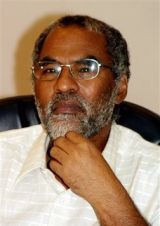Sudan papers mourn death of beheaded editor
Sept 7, 2006 (KHARTOUM) — The beheading of a Sudanese editor who had angered some Islamists might mark the start of a gruesome new trend, commentators said on Thursday.

“Something must be done before the abduction phenomenon develops into a practice,” said state-owned Sudan Vision, which printed in black and white in respect for Taha’s funeral due to take place on Thursday.
No one has claimed responsibility for his death and Sudanese are at a loss as to who committed the crime, which many call a first in the history of the nation.
Sudanese police said they had made some arrests but were no closer to solving the crime. All papers covered their front pages with pictures and stories of the brutal killing.
The semi-independent al-Watan paper warned this type of bloodshed rarely ended with just one crime. “When you open this evil door to hell and knives and bullets take the place of the pen, this means we are…. on the path to chaos.”
Last year Taha was tried and his paper closed for three months for blasphemy, but sources said he was under close protection by the government during his time in prison.
Some of Khartoum’s Islamic groups protested angrily at his trial shouting threatening slogans.
Taha himself was an Islamist, but colleagues said he had “strange views”, which often angered the mainly Sunni Muslim population.
In the 1990s, an attempt was made on his life after he wrote an article about Islamist leader Hassan al-Turabi which offended many.
Mainly Muslim Sudan is under sharia Islamic law in the north, but while it has suffered multiple regional civil wars, it has not seen the extremist violence that has surfaced elsewhere in the Middle East.
The al-Tafkir wa al-Hijra (renunciation and exile) group opened fire on a mosque in 2000 killing 20 worshippers. Another 12 people were killed in a mosque in another attack in 1996.
Wednesday’s killing was much more covert.
“The circumstances are very murky,” said journalist Sabah Mohamed al-Hassan. “This is the first time we see something like this in the history of this country.”
The picture viewed by a Reuters witness of his body, hands and legs tied with his head lying next to his corpse, evoked spectres of similar crimes in Iraq.
Sudan hosted militant Al Qaeda leader Osama bin Laden in the 1990s. Bin Laden and his deputy Ayman al-Zawahiri have warned they would come to Sudan to fight if U.N. forces entered Darfur.
A week ago the Security Council passed a resolution to begin deploying more than 20,000 troops and police by year-end.
Khartoum has likened the plan to a Western invasion that would attract jihadi militants and create an Iraq-like quagmire.
(Reuters)
